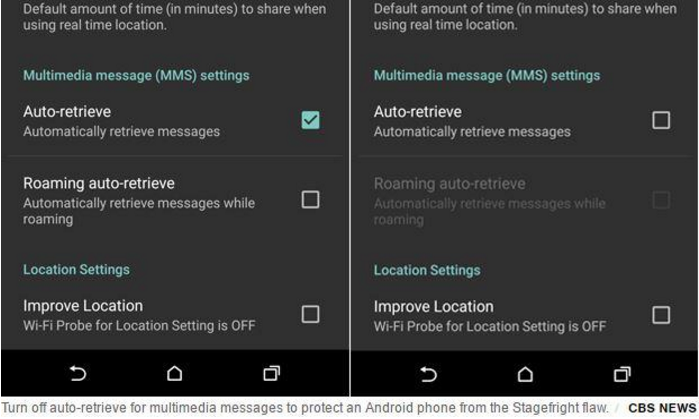Android is one of the most vulnerable operating systems for smartphones — Here are some easy tips to protect your Android devices from hackers.
In the old days, people used to carry laptops around for multitasking and to use the internet. But things have changed since then people use smartphone and tablets in their everyday activities. Smartphones now are more advanced and capable machines similar to computers, which can be used for banking transactions, online shopping, internet surfing, and many other tasks.
The more people use their device for multiple tasks, the more synced they get with it. Your personal information, credit cards details, and passwords all get linked to your device which makes it more susceptible to hacks. Like the rest, Android is no exception. In the recent news at CBS-News, a security research firm found an android hack which they called – mother of all android vulnerabilities – a flaw that can allow hackers to hack your Android device with just a multimedia text.
Case in point here is that your entire personal information is trackable and downloadable using hacks and flaws. You can use a few easy steps to strengthen your device security.
1. Break the habit of saving important passwords
People tend to save passwords in their browser and apps to avoid re-entering their details, thinking who would access their phones except them? but hackers can. You should avoid saving passwords, especially in banking websites or apps.
2. Turn On Screen Lock
Android has a screen-lock feature on its every device. It provides a layer of security to your device. There are several types of screen lock which you can choose from including the password, pattern, face detection, and pin. Set up a strong password or pattern lock which makes it hard to access.
3. Use App Lock
App lock adds an extra layer of security to your device, which can prevent users from accessing your important apps, or in case if your device gets stolen or lost.
You can use AppLock from Google Play Store for this purpose. It can lock apps which you don’t want other people to access. Try setting up a strong password, and make sure you don’t leave smudges on the device screen for someone to figure it out.
4. App Permission
Android works on the concept of sandbox. Each app requires a list of permissions before execution. Always read permission before allowing it access e.g. an alarm app wouldn’t ask you for mic access. This step is important because not all apps on the Google play store are safe. Google does remove malicious apps from its store but there are millions of apps on the market.
Before installing any app, do review the comments of people. It gives you insight into how the app really is.
5. Turn Off automatic message retrieval
The flaw that exploited 950 million Android devices across the world and dubbed as “Stagefright.” It used android’s media playback tool which helps you download images and videos that people sends. Hackers used this flaw to send hacking codes in multimedia messages which started to retrieve automatically because of the built-in feature.
You can disable this feature in Android.
1) Open your default message app or another app which you use alternatively for retrieving messages.
2) If you are not sure which app is used for MMS retrieval, go to your phone’s setting, select “more” tab under the Wireless & networking section and find for “default messaging app.”
3) Open that app and go into the settings and look for “auto-retrieving multimedia messages.”
4) Uncheck the option.

6. Use Security App
Mobile security app provides most of the security android need. Companies like Kaspersky, ESET, Avast and more, made it their motive to remove malicious software, security flaws, and other hack attacks. Security app also provides an anti-theft feature, which erases your personal data remotely from your device in case if it gets stolen or lost. There are many security apps available in free and paid versions.
One such app is ESET Mobile Security & Antivirus. According to the latest test results conducted by AV-Test, an independent IT-Security Institute showed that ESET has 99.9% threat detection rates.
7. Network Encryption App
Your web-browsers are vulnerable and exposed to exploit. Most of the common hacks are done by redirecting your web request to malicious server locations. Or your mobile is exposed through cookies when you are using public Wi-Fi, other people can impersonate you and access your personal information and accounts like Facebook and other sites.
You can use some free android encryption app or some paid VPN for Android on Google Play Store which provides premium dedicated service to protecting your information and always send encrypted outgoing data.
Perform regular backups
Consider your mobile gets stolen, lost, or you just upgrade your device? what would you have in the backup? Android backup support provides this service thinking that in mind. It is recommended to perform regular backups in case if anything happens to your device.








